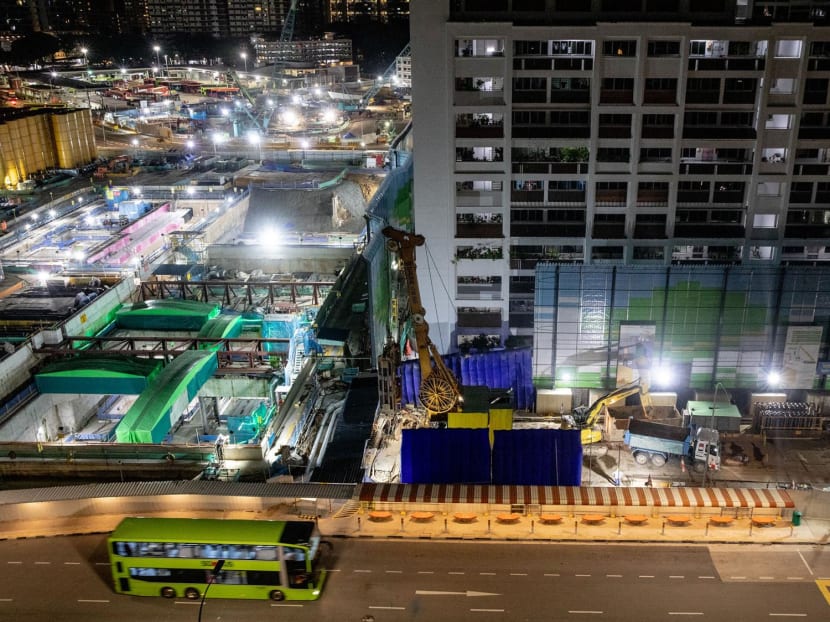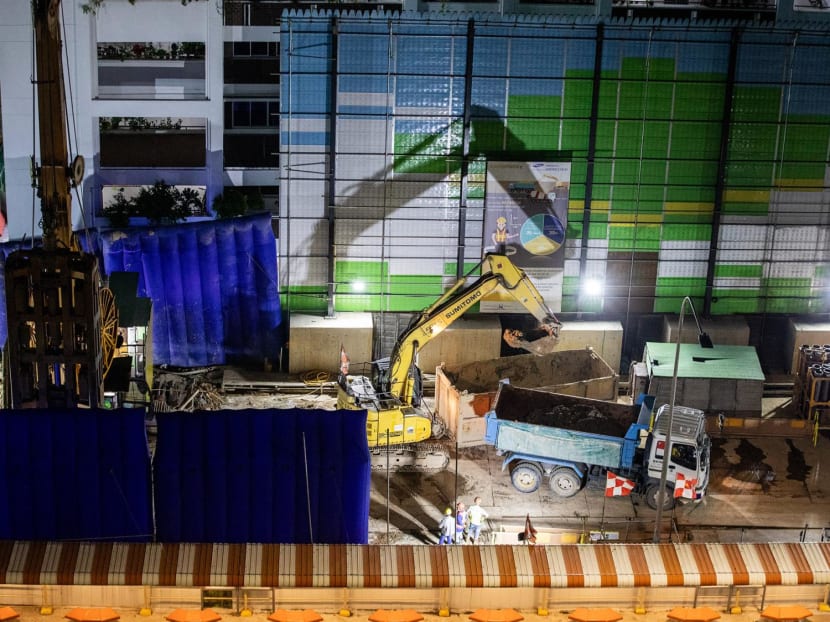Late-night noise at MRT site irks Hougang residents; LTA says work can't be stopped for safety reasons
SINGAPORE — Residents in Hougang have complained about construction noise from a Cross Island Line worksite at night, but the authorities say that safety concerns in building a "diaphragm wall" is the reason why work has to sometimes continue into the wee hours of the night.

A construction site next to a public housing block at Hougang Avenue 10. The construction was still going on at about 11pm on April 15, 2024.

This audio is AI-generated.
- Residents living near a Cross Island Line construction site in Hougang have complained about noise late at night
- The authorities said that work has to continue at night because of safety concerns related to building a diaphragm wall
- The diaphragm wall is crucial for stabilising soil during deep excavation for underground MRT lines and stations
- The LTA told TODAY that excavation works related to building the diaphragm wall would be completed by 2026
- At least one resident has gone to stay elsewhere due to broken sleep, while others said it was a necessary inconvenience for future benefits
SINGAPORE — Residents in Hougang have complained about construction noise from a Cross Island Line worksite at night, but the authorities say that safety concerns in building a "diaphragm wall" is the reason why work has to sometimes continue into the wee hours of the night.
In response to TODAY's queries, the National Environment Agency (NEA) said in a joint statement with the Land Transport Authority (LTA) on Monday (April 15) said that between January and March this year, they had received eight "feedback cases" from Block 513 Hougang Avenue 10 residents regarding the noise.
The agencies added that due to the set-up of a diaphragm wall, excavation work has to be carried out “continuously” for safety, in order to prevent “trench instability risks that may lead to soil collapse and cause damage to nearby infrastructure or building structure”.
“Other construction activities, which can be stopped without safety risks, end by 10pm.”
In response to queries from TODAY, an LTA spokesperson said on Friday that excavation for the construction of diaphragm walls would be completed by 2026.
Mr David Ng, chairman of the civil and structural engineering technical committee at the Institution of Engineers, separately told TODAY that a diaphragm wall is a reinforced concrete wall with a thickness ranging from 1.0m to 1.5m and a depth of up to 80m to retain soil during deep excavation.
“Diaphragm walls are needed to support the ground during deep excavation to minimise ground settlement and impact to the surrounding structures and buildings,” Mr Ng said.
Given that the Cross Island Line is fully underground, deep excavation is required to construct the underground stations, he added.
At 50km, the line will be Singapore’s longest fully underground line.
Construction at the Hougang station of the new MRT line began in January last year after a groundbreaking ceremony and will be completed in phases, LTA said at the time.
The excavation work for the diaphragm wall was still ongoing as of Thursday.
The expected completion date for 12 stations in the first phase, including Hougang, is 2030.
On Wednesday, TODAY visited Block 513 Hougang Avenue, which directly faces the construction site, and spoke to 11 residents about how they are being affected.
Some residents said that they found the construction noise disruptive, especially in the evenings and needed to close their windows and doors to muffle the sounds.
Others described the construction noise, whether during the day or night, as a mild nuisance that they could “bear with” and are looking forward to the MRT line opening in future.
In their statement, LTA and NEA said that in accordance with NEA's requirements for major infrastructure projects, the contractor at the Hougang site has conducted a noise impact assessment and implemented a noise management plan to mitigate noise from the construction project.
This included putting up 12m-tall noise barriers, where possible, along the perimeter of the construction worksite.
In addition, localised noise enclosures and noise balloons, which are inflatable noise barriers, have been deployed close to the operating machinery to further reduce noise levels.
The agencies added that LTA and the contractor have been engaging residents and businesses in the neighbourhood, providing them updates on the project milestones and informing them in advance when noisy work is expected in the vicinity.
DUST AND DISRUPTED SLEEP
While the daytime construction noise is understandable and even “tolerable” with the hustle and bustle of traffic, the construction noise at night have been disrupting the sleep of some residents.
One of them went on online forum Reddit and wrote in frustration: “2.40am and the construction of CRL (Cross Island Line) is pounding again.”
The post was accompanied by a 33-second video showing that lights are still on at the worksite and there is a thumping sound.
The writer also said that "numerous" calls were made to NEA but to no avail.
Another Hougang resident, Ms Lyn Koh, 25, told TODAY that she is quite a light sleeper and gets woken easily by sudden noises.
As a result of the noise from the work site, her sleeping schedule had been “pretty messed up”.
“The noise disrupted my sleep and quality of rest and affected my well-being.”
The communications manager described the noises as "cling-clang” sounds of equipment, workers shouting, vehicles reversing and machinery churning at night.
“Sometimes, I thought I would have a good night's rest at around 8pm or 9pm when there were no sounds of construction. Then the (construction) work would resume from 10pm onwards, when I could hear the workers and the machinery.
“It is quite triggering and overstimulating to me. Hence, it has taken a toll on my health.”
Ms Koh has tried everything from earplugs to noise-cancelling headphones, but they have not helped much.
In a bid to improve her sleep, Ms Koh said that she recently moved out to stay with a relative upon learning that the MRT line will only be completed in 2030. Ms Koh still visits her home in Hougang occasionally to see her parents or to get her things but said that she would not sleep there if she can help it.
The same goes for 26-year-old freelancer Angelo, who gave only his first name and said that the noises at night can disturb his sleep.
“In the morning, you can say it’s tolerable, but in the evening, everyone wants to rest.”

PUTTING UP WITH NOISE FOR FUTURE CONVENIENCE
A few residents told TODAY that even though the construction sounds can be irritating, these do not affect them as much as for others, and they know the construction will ultimately benefit them.
Madam Eng Soo Luan, a 65-year-old housewife, said: “It’s noisy for a bit, but then the location would be so good and it will be very convenient to travel.”
She thought that the workers might be rushing a deadline, so it was understandable that they worked into the night.
Another resident Kamisah Atheli, 47, a tour guide, said that her family members “don’t find (the noise) a nuisance".
“Every construction site is very noisy. What was the problem? I mean, if you want something good, you have to sacrifice a little bit,” she added.
“If they can settle this (Cross Island Line construction) fast, it’s better for everyone. Everyone gets to enjoy the ride.”










